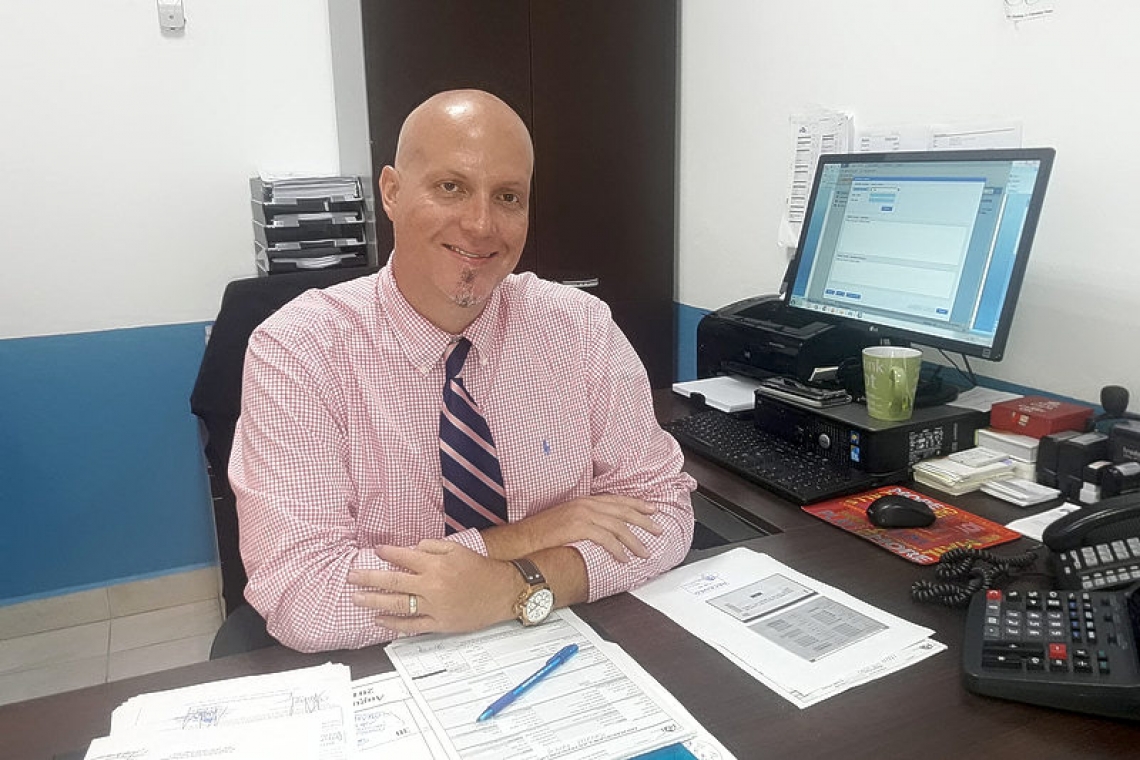Ways of doing business have drastically changed in light of the new coronavirus COVID-19 pandemic. As with other banks and businesses, PSB Bank N.V. has taken precautionary measures, which include limiting opening hours, implementing social distancing, welcoming clients by appointments only, and having clients apply for loans and other services via email rather than by walking into the bank. To gain perspective on doing business right now in St. Maarten, The Weekender spoke to General Manager Wayne Johnson.
The recent precautionary measures were not made by choice, but do you see any silver lining here?
I would say the silver lining is that it’s forcing people to be more prepared for the modern world. Take emails, for example. Emailing can save a person a lot of time, from getting in their car, wasting gasoline, finding a parking spot and waiting in line, when they could have just sent an email and received the information at the click of a button. So in that respect, becoming more modernised is a good thing.
Do you have any (financial) advice for clients, given the uncertain times ahead?
The economy is going to bounce back, eventually. Most banks will come up with programmes to help people in need, as we did after Irma. For some, it might be across the board; and for others, on a case-by-case basis. At the end of the day, it comes down to banks not wanting you to go into debt.
I would also say we have to be more vigilant in what we do, as a people. What are you spending on, where, and towards what? Calamities happen, and what if the bank did not give a grace period? Who would have thought this would happen three years after Irma? Hopefully, this passes soon, but then hurricane season is coming up again.
We can’t only rely on the banks or government, but should strive to be able to help ourselves. We can re-evaluate now, during crises like these. Think of strategies for ourselves, our families and for the future.
We have lots of freelancers, small- and microbusinesses here on the islands. People worldwide are concerned about what this crisis means for these businesses in particular. Any advice for them?
One of the common problems with microbusinesses in particular is the lack of paperwork, and the businesses not following regulations. That makes it much harder for them to deal with banks, since it’s harder for us to evaluate them and see how exactly we can help. What would help is audited financials.
With this sort of information in place, it becomes easier to work together. Even if you go to organisations set up specifically to help small businesses, they still need to see this type of information. Several companies offer accounting services for small businesses. Spend the extra buck to have this done properly, by a certified accountant.
Income levels tend to fluctuate, especially for these smaller businesses. How much financial history do you need to see in order to be able to evaluate these clients?
At least two years. If it’s a new business, then we would ask for a forecast and business plan to begin with.
Is it also advised that this be done by a specialist and not by the entrepreneurs themselves?
Most people can do it themselves, as long as they are realistic. However, you always benefit from expert advice.
No one saw the effects of this pandemic coming. In your experience, are disease outbreaks even on the radar of banks when it comes to preparing for economic upsets?
I’ve been with PSB Bank NV for four years now and in the banking and general insurance industry for 23 years. I’ve never seen a disease outbreak affect the economy in this way; no, as many outbreaks did not hit our shores. We weren’t all that worried when first hearing about it in China, but what got us worried was when it hit Europe, and then it hit the US. Most of our tourism, 75% at least, is from North America, of course.
How would you compare this to the outlook after Irma?
One of the major differences is that we have more uncertainty now. After a hurricane, there’s a sense of knowing what to fix, so that we can get the island back in order. But we don’t have control over the international and US markets, cruise ships, or air travel, for example.
What does the relief package entail?
We’re offering a grace period on loan payments for the months of April, May and June. It is offered on a case-by-case basis, for clients who have lost income or employment as a result of the crisis. Everything is being channelled through email. The clients should include their name, loan account number, and the reason the grace period is necessary. From there, we can evaluate the situation to see how we can help.
What do you most look forward to when the crisis is over?
Getting back to some sort of normalcy. Getting together with friends, family, going out and not staying six feet away from people. Our sense of humanity has changed – it’s in our nature to hug, kiss, shake hands – but I think even after this, society will change when it comes to that.
If your income has been affected by the crisis, contact PSB Bank N.V. with the relevant details via email at This email address is being protected from spambots. You need JavaScript enabled to view it. to see if you qualify for a relief package. New opening hours for the time being are weekdays 8:30am to 2:00pm. Visit www.psbbanknv.com/psb-st-maarten for more general information.







